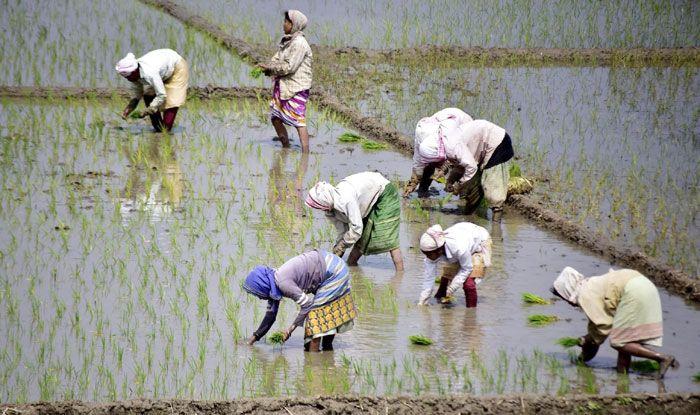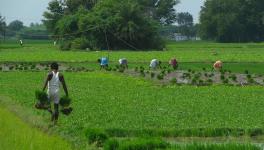Is Loan Waiver Scheme the Solution for Karnataka Farmers’ Plight?

Representational Image. Image Courtesy: IANS
Karnataka government on June 12, 2019, announced that it would release the full money required to waive off the farm loans in the commercial banks of the farmers across the state. In its election manifesto, the ruling Janata Dal (Secular) had stated that the government would waive off all agriculture loans in a single go. This would include crop loans, horticulture loans, and medium-term loans availed by the Karnataka farmers. In their maiden budget presented on July 9, 2018, the government had announced the farm-loan waiver scheme but in stages.
Chief Minister H D Kumaraswamy had announced waivers amounting to Rs 34,000 crore, while the total farm loans amounts to around Rs 1.20 lakh crore. The government had to reimburse Rs 10,500 crore to banks for the loan waiver scheme the previous year, and would be generating funds for the rest of the amount through an increase in taxes on fuel, electricity, motor vehicles and alcohol, as announced in the budget. In the second phase, an incentive of Rs 25,000 had to be distributed to the 27.67 lakh farmers who had repaid their loans on time ‘to prevent complaints that only defaulters have benefited’. This had displeased many farmers who had expected their burden of loans would be cleared off in a single go.
Also Read: K’taka Farmers Protest for Loan Waivers, Demands the Govt Fulfil its Pre-Poll Promises
According to a report by The Hindu, so far, of the estimated Rs. 8,550 crore required to fund various types of loan accounts in commercial banks, the government has already released Rs. 3,930 crore towards 7.49 lakh accounts. The government will have to release about Rs. 4,620 crore to complete the waiver process in commercial banks of which about Rs. 1,219 crore is ready for disbursal. In the budget for the financial year 2018-2019, the government had allocated Rs. 6,500 crore for the scheme, and Rs 6,150 crore for the year 2019-2020. However, as NewsClick had reported earlier, a total of 13,988 farmers have lost the money which were deposited into their accounts in nationalised banks as part of the state government’s loan waiver scheme.
Most of the small farmers and landless labourers avail loans from the local money lenders and these loans are lent with higher rates of interests, sometimes up to 20%. According to the Karnataka Money Lenders and Pawnbrokers Act 1961, a moneylender is an individual or an undivided Hindu family or a company or an incorporated body of individuals, who or which carries the business of money lending in the state. Debtors availing loans from these moneylenders fall into a vicious debt trap, as it becomes impossible for them to repay the principal amount. The moneylenders usually resort to extreme steps of public humiliation and unlawful methods and harass the defaulters of the debts. According to a report in the Deccan Herald, “While there is no official figure on total such loans availed, Karnataka has 8,274 pawnbrokers and 10,692 moneylenders registered in the state.”
Also Read: #DroughtDistress: Karnataka Runs Dry for Fourth Consecutive Year
A study conducted by the Institute for Social and Economic Change (ISEC), Bengaluru, in 2015 had shown that, “Non-institutional loan was one of the causes of the farmers’ suicides and 85% of the Karnataka households surveyed in the study, identified crop loan as the most important reason behind the suicide committed by a family member of the household.”
One has to note that the farmers in the state are in severe distress due to the four consecutive years of drought. It has been said time and again by experts that the state government should work out a plan that would help farmers in the long run. As former director of ISEC, Professor R S Deshpande rightly observes, “The state has a disproportionate share of drought-prone areas in the country. The losses incurred by the farmers in the last three years due to drought had made it impossible for them to repay their loans. The state is yet again facing a severe drought situation and there has been a severe crop loss in 100 out of 175 talukas.”
According to the statistics provided by the State Agriculture Department, 3,515 farmers were reported to have committed suicide from April 2013 to November 2017, which is a sharp increase from 1,125 cases of farmer suicides in the period April 2008 to April 2012. Out of the 3,515 suicide cases reported, 2,525 cases were due to drought and crop failure.
There is a need of scientific solution, and the government as its predecessors, instead continue to look at farmers as vote banks. They continue to be occupied with the populist schemes such as the loan waiver scheme. Even though CM Kumaraswamy has clarified that this move of the government has got nothing to do with the recent general election results, would this scheme resolve the agrarian crisis in the state? The question remains unanswered.
Also Read: Karnataka Assembly Passes Debt Relief Bill 2018 to Reduce Farmers’ Woes
Get the latest reports & analysis with people's perspective on Protests, movements & deep analytical videos, discussions of the current affairs in your Telegram app. Subscribe to NewsClick's Telegram channel & get Real-Time updates on stories, as they get published on our website.
























